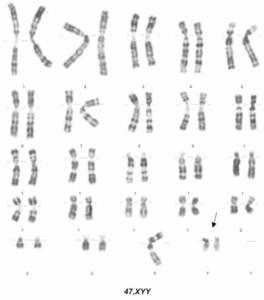
A recent study from the UK of more than 207,000 adult men revealed something surprising - about 1 in 500 men did not have the typical XY sex chromosomes, but instead have XXY (Klinefelter Syndrome) or XYY. And only 23% of those with XXY and 0.7% with XYY actually knew it or this was recorded in their medical records!
This means that most of the men did not have any obvious reason to do genetic screening. The men, all of European ancestry and between the age of 40 and 70 years, participated in the UK Biobank (so these adults were considered healthier than the general public).
One finding is that the XYY and XXY men tended to have more health problems than typical XY men, more lived alone or without a partner than XY men, and more reported loneliness.
Some of the XXY men had received the XXY diagnosis during adolescence for delayed puberty, or later for infertility or lower testosterone levels. Other features can include tall adult stature, high body fat percentage, poor muscle tone, low bone mineral density, and increased risks of neurocognitive disability, psychoses, and disorders of personality.
On the other hand, XYY men tended to have normal sexual development and fertility. Features can include being tall, scoliosis, learning difficulties, poor muscle tone, increased central fat (abdominal fat), seizures, asthma, and emotional and behavioral problems (e.g., attention deficit disorder).
But what was surprising was that both XXY and XYY men were similarly at higher risk for several conditions: type 2 diabetes, venous thrombosis, pulmonary embolism, and chronic obstructive pulmonary disease. [See tables in study.]
Even though XXY and XYY can result in learning difficulties, also note that while 40.4% of XY men had graduated college, 16.3% of XXY, and 20.2% of XYY also had. In other words, there are heightened risks of certain problems (including diseases), but that doesn't mean it definitely results in problems. As the researchers point out: there are increased risks of "potentially preventable diseases", including the "metabolic and vascular diseases".
One question comes to mind: If there is no obvious reason, should a person (even babies) receive genetic screening to see what their sex chromosomes are? Does everyone really want to know? Is there really a need to always know by the person or others? Employers? To be labeled by insurance companies? Especially if there is no obvious reason to test.
From Medical Xpress: One in 500 men carry extra sex chromosome, putting them at higher risk of several common diseases
Around one in 500 men could be carrying an extra X or Y chromosome—most of them unaware—putting them at increased risk of diseases such as type 2 diabetes, atherosclerosis and thrombosis, say researchers at the universities of Cambridge and Exeter.
In a study published in Genetics in Medicine, researchers analyzed genetic data collected from more than 200,000 U.K. men aged 40–70 from U.K. Biobank, a biomedical database and research resource containing anonymized genetic, lifestyle and health information from half a million U.K. participants. They found 356 men who carried either an extra X chromosome or an extra Y chromosome.
Sex chromosomes determine our biological sex. Men typically have one X and one Y chromosome, while women have two Xs. However, some men also have an extra X or Y chromosome—XXY or XYY.
Without a genetic test, it may not be immediately obvious. Men with extra X chromosomes are sometimes identified during investigations of delayed puberty and infertility; however, most are unaware that they have this condition. Men with an extra Y chromosome tend to be taller as boys and adults, but otherwise they have no distinctive physical features.
In their study, the researchers identified 213 men with an extra X chromosome and 143 men with an extra Y chromosome. As the participants in U.K. Biobank tend to be "healthier" than the general population, this suggests that around one in 500 men may carry an extra X or Y chromosome.
Only a small minority of these men had a diagnosis of sex chromosome abnormality on their medical records or by self-report: fewer than one in four (23%) men with XXY and only one of the 143 XYY men (0.7%) had a known diagnosis.
By linking genetic data to routine health records, the team found that men with XXY have much higher chances of reproductive problems, including a three-fold higher risk of delayed puberty and a four-fold higher risk of being childless. These men also had significantly lower blood concentrations of testosterone, the natural male hormone. Men with XYY appeared to have a normal reproductive function.
Men with either XXY or XYY had higher risks of several other health conditions. They were three times more likely to have type 2 diabetes, six times more likely to develop venous thrombosis, three times as likely to experience pulmonary embolism, and four times more likely to suffer from chronic obstructive pulmonary disease (COPD).
The researchers say that it isn't clear why an extra chromosome should increase the risk or why the risks were so similar irrespective of which sex chromosome was duplicated.
Yajie Zhao, a Ph.D. student at the Medical Research Council (MRC) Epidemiology Unit at the University of Cambridge, the study's first author, said: "Even though a significant number of men carry an extra sex chromosome, very few of them are likely to be aware of this. This extra chromosome means that they have substantially higher risks of a number of common metabolic, vascular, and respiratory diseases—diseases that may be preventable."
Professor Anna Murray, at the University of Exeter, said: "Our study is important because it starts from the genetics and tells us about the potential health impacts of having an extra sex chromosome in an older population, without being biased by only testing men with certain features as has often been done in the past."
